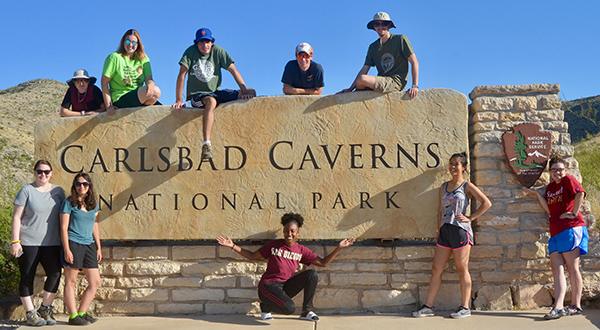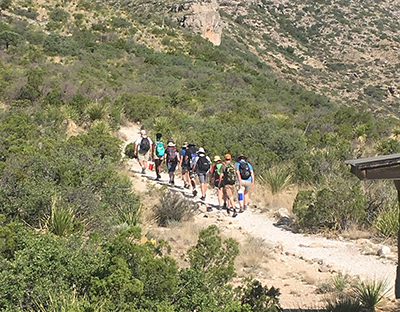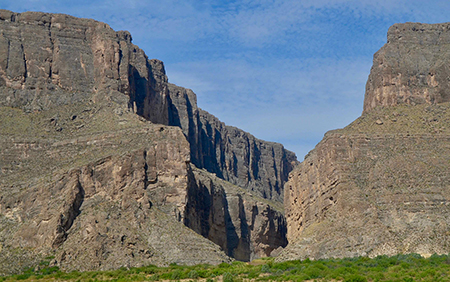Two-week tour traverses time, students visit Texas geologic outcrops

The geology of Texas captivated the attention of nine Lamar University Earth Science and Geology majors recently as they spent two weeks exploring and camping in classic geologic outcrops in Central and Trans-Pecos Texas.
University Professor Jim Westgate and Julia Zidan, teaching assistant and a 2018 Lamar graduate with a bachelor’s degree in Earth Science, led the capstone course, called Field Geology of Texas.
The first stop was in the heart of Central Texas at Enchanted Rock State Natural Area. There the group climbed to the top of the oldest rocks in Texas, a one billion-year-old mass of pink granite known as an exfoliation dome, Westgate said.
The class then headed west to Big Bend National Park in the Chihuahuan Desert where they camped high in the Chisos Mountains to escape the desert heat. The Chisos Mountains were formed by volcanic activity from about 45- to 30-million-years ago.
 “The group was amazed while hiking into the bottom of Santa Elena Canyon along the Texas-Mexico border,” said Westgate, who holds a Ph.D. in geology from the University of Texas. “There, the Rio Grande River has carved down 1,500 feet thru marine limestones that were buried at the bottom of a 100-million-year-old tropical ocean, which extended from the ancient Gulf of Mexico to the Arctic Ocean and is known to geologists as the Cretaceous Interior Seaway.”
“The group was amazed while hiking into the bottom of Santa Elena Canyon along the Texas-Mexico border,” said Westgate, who holds a Ph.D. in geology from the University of Texas. “There, the Rio Grande River has carved down 1,500 feet thru marine limestones that were buried at the bottom of a 100-million-year-old tropical ocean, which extended from the ancient Gulf of Mexico to the Arctic Ocean and is known to geologists as the Cretaceous Interior Seaway.”
From Big Bend, the group headed north to Davis Mountains State Park where they saw the remains of volcanic lava flows some 30-million-years-old. “After camping in the park, we headed further north and more than 250 million years back in time as we entered Guadalupe Mountains National Park,” Westgate said.
On the Permian Reef hiking trail the students observed geologic evidence left behind by the Capitan Reef complex that fringed the edge of the Delaware Sea some 270-260 million years ago during the Permian Period and before the age of dinosaurs. In Carlsbad Caverns National Park in New Mexico, the students were able to hike inside the reef complex and escape the heat of the Chihuahuan Desert in the caverns’ cool 58 degrees.
 The group then began trekking east and made a two-day base camp at McKinney Falls State Park in Austin. From there they ventured to the South Fork of the San Gabriel River to see 100-plus million-year-old dinosaur trackways exposed in the Glen Rose Limestone. Both tracks of the bipedal carnivore Acrocanthosaurus and the long-necked Paluxysaurus, are exposed in the riverbed’s limestone outcrops, Westgate said.
The group then began trekking east and made a two-day base camp at McKinney Falls State Park in Austin. From there they ventured to the South Fork of the San Gabriel River to see 100-plus million-year-old dinosaur trackways exposed in the Glen Rose Limestone. Both tracks of the bipedal carnivore Acrocanthosaurus and the long-necked Paluxysaurus, are exposed in the riverbed’s limestone outcrops, Westgate said.
The last stop before returning to LU was at the University of Texas, Jackson School of Geosciences’ Vertebrate Paleontology Lab where Ernie Lundelius, John A. Wilson Professor Emeritus in Vertebrate Paleontology, and an expert on Ice Age fossils, led a tour of the fossil research collections and preparation facilities.
Geology, earth science, and the related fields in space science include studies of the physical, chemical, and biological processes of the whole Earth, and the space environment in which the Earth is an integral part.
Lamar University’s Department of Earth and Space Sciences provides students with an in depth education in the areas of geology, Earth science, and space science. The department offers Bachelor of Science degrees in geology and earth science, and minor degrees in geology, earth science, and space science.
To learn more about geology programs at Lamar University and the Department of Earth and Space Sciences visit lamar.edu/arts-sciences/earth-and-space-sciences/.


